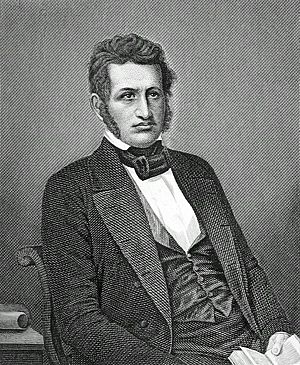Friedrich Christoph Dahlmann facts for kids
Friedrich Christoph Dahlmann (born May 13, 1785, died December 5, 1860) was an important German historian and politician. He is remembered for his strong belief in a united Germany and for standing up for people's rights. He taught at universities and played a big part in the political changes of his time.
Contents
Early Life and Education
Friedrich Dahlmann grew up in Wismar, a town that was then part of Sweden. His family had a long history in the Hanseatic League, a group of trading cities. His father wanted him to study theology, but Friedrich was more interested in philology, which is the study of language and literature.
He studied at universities in Copenhagen and Halle between 1802 and 1806. After his studies, he translated old Greek plays. He also loved modern books and philosophy. The difficult times he lived through made him feel very patriotic about Germany. However, he was always proud of his connection to Scandinavia.
Early Political Involvement
In 1809, when war broke out in Austria, Dahlmann joined the Imperial army. He hoped to turn the Austrian war into a bigger German movement, but this hope ended after the defeat at Wagram.
He then moved to Denmark. In 1811, he became a lecturer at the University of Copenhagen. He taught about ancient literature and history. Soon after, in 1812, he became a professor at the University of Kiel. This job changed his life. It made him focus on history, and it also got him involved in politics.
In 1815, he became a secretary for the estates of Schleswig-Holstein. He started writing articles and memoirs to defend the rights of these regions against Denmark. He also highlighted their strong connection to Germany. Some people later blamed him for starting the "Schleswig-Holstein question." This was a big political issue that led to a war in 1864. His work helped him understand how states work and how to make practical changes. He believed in developing new ideas from old ones, rather than just speculating.
Standing Up for Rights
Around 1829, Dahlmann moved to the University of Göttingen. Here, he helped create the Hanoverian constitution of 1833. This new constitution updated the old aristocratic government. It was a necessary change after the July Revolution in Paris.
However, in 1837, the new king, Ernest Augustus, King of Hanover, said the constitution was no longer valid. Dahlmann then led a famous protest with six other professors. They became known as the Göttingen Seven. Because of this, Dahlmann lost his job and was sent away. But his brave action boosted German national pride. People even donated money to help him financially.
A Professor and Politician
After living in Leipzig and Jena for a few years, Frederick William IV of Prussia offered him a professorship. In October 1842, Dahlmann began teaching at the University of Bonn. These were his most famous years.
He had already become known for his book Politik (published in 1835). He then wrote Dänische Geschichte (1840–1843), a very important historical work. After that, he wrote histories of the English Revolution and the French Revolution. These books were not just academic; they strongly supported the idea of a constitutional monarchy. This is a system where a king or queen shares power with an elected government.
As a teacher, he was very popular. Even though he wasn't a great speaker, his clear thinking and strong character deeply impressed his students.
The 1848 Revolution
When the 1848 revolution began, Dahlmann was seen as a key figure. He was called the "father of German nationality." He was elected to the national assembly in Frankfurt. He played a leading role in the committees that worked on a new constitution.
His main goal was to create a united Germany. He wanted it to be a constitutional monarchy, but without Austria or at least its non-German parts. He believed Prussia should provide the emperor. However, he also thought Prussia should give up its separate identity, just like the other states.
A big problem arose when King Frederick William IV made a truce with Denmark in August 1848. Dahlmann thought the national parliament should not recognize this truce. He wanted to make it clear that the parliament had authority over Berlin. His motion passed by a small number of votes. But then, his own party members voted against it, accepting the truce. Dahlmann tried to form a government but failed.
He later said this was a turning point for the parliament. He didn't give up hope right away. He worked hard on commissions and in party meetings. Thanks to his efforts, a German constitution was finally created. Frederick William IV was even elected as the hereditary emperor in March 1849. Dahlmann was part of the group that offered the crown to the king in Berlin.
The king refused the crown. Dahlmann hoped that the people's support would force the king to accept the constitution. But when he saw that radical groups might cause a revolution, he decided to leave the national parliament in May 1849.
He continued to be involved in some political meetings, like the conference in Gotha. He also took part in the Prussian chamber and the parliament of Erfurt. But eventually, he realized that efforts to unite Germany were not working at that time. He then retired from political life and returned to teaching at Bonn.
His last years were difficult due to illness and personal losses. He passed away after a stroke.
 | Calvin Brent |
 | Walter T. Bailey |
 | Martha Cassell Thompson |
 | Alberta Jeannette Cassell |


